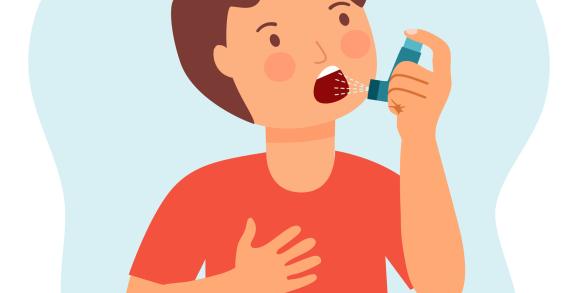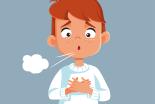We're hiring ! Join us and make a difference in our hospitals
Asthma

What is asthma?
Asthma is a chronic illness that is most common in children and that affects the respiratory tracts.
In an asthmatic child, bronchial hyperresponsiveness and inflammation result in recurrent episodes of wheezing, coughing, shortness of breath and chest tightness. These symptoms can be triggered by a number of factors, such as allergens, respiratory infections, physical exercise or exposure to irritants or pollutants such as tobacco smoke. Asthma treatment involves taking medicine to control the inflammation of the respiratory tracts and the use of emergency medicine to relieve acute symptoms.
"Good" asthma management in children requires a good understanding on the part of the parents and the child of the factors that trigger the crises, warning signs and the correct use of medicines.
Regular follow-up at the Hospital makes it possible to adjust the treatment in line with the child's needs.
Care
During the consultation at the Children's Hospital a complete assessment is carried out to determine the severity of the asthma and the specific triggers. The treatment includes the administration of bronchodilators to relieve the acute symptoms and anti-inflammatory drugs to reduce the respiratory tract inflammation in the long term. Patients and their families are also educated to better understand asthma, recognise the triggers and administer the medicines correctly. The Children's Hospital also puts into place an action plan for asthma management at home with advice on measures to avoid the triggers and on monitoring the symptoms. There is regular follow-up to assess the response to treatment, adjust the medication if necessary and provide continuous support for patients and family.
Advice to parents
- It is important to ensure that your child is taking his or her medicine regularly and is respecting the doctor's recommendations
- Lean to identify the asthma attack triggers: (allergens, tobacco smoke, air pollution, etc.)
- Ensure your child has a balanced diet, practices regular physical activity and sleeps enough.
- Create a healthy environment in the home: avoid allergens and ensure the indoor air is healthy and well ventilated. If you are smokers you should either stop smoking or always smoke outside!
- Be prepared for an asthma attack: always have emergency medicines close at hand.


Our specialists
- Pr Laurence Hanssens, Clinic Director
- Pr Nicolas Lefèvre
- Dr Christine Quentin
- Pr Georges Casimir
- Dr Sabine Rozenberg
- Dr Fabien Carlier
- Dr Dimitrios Salamouras
- Dr Ana-Maria Grumaz
- Dr Isabelle Jacques
- Dr Valérie Sputael
- Dr Arnaud Louagé